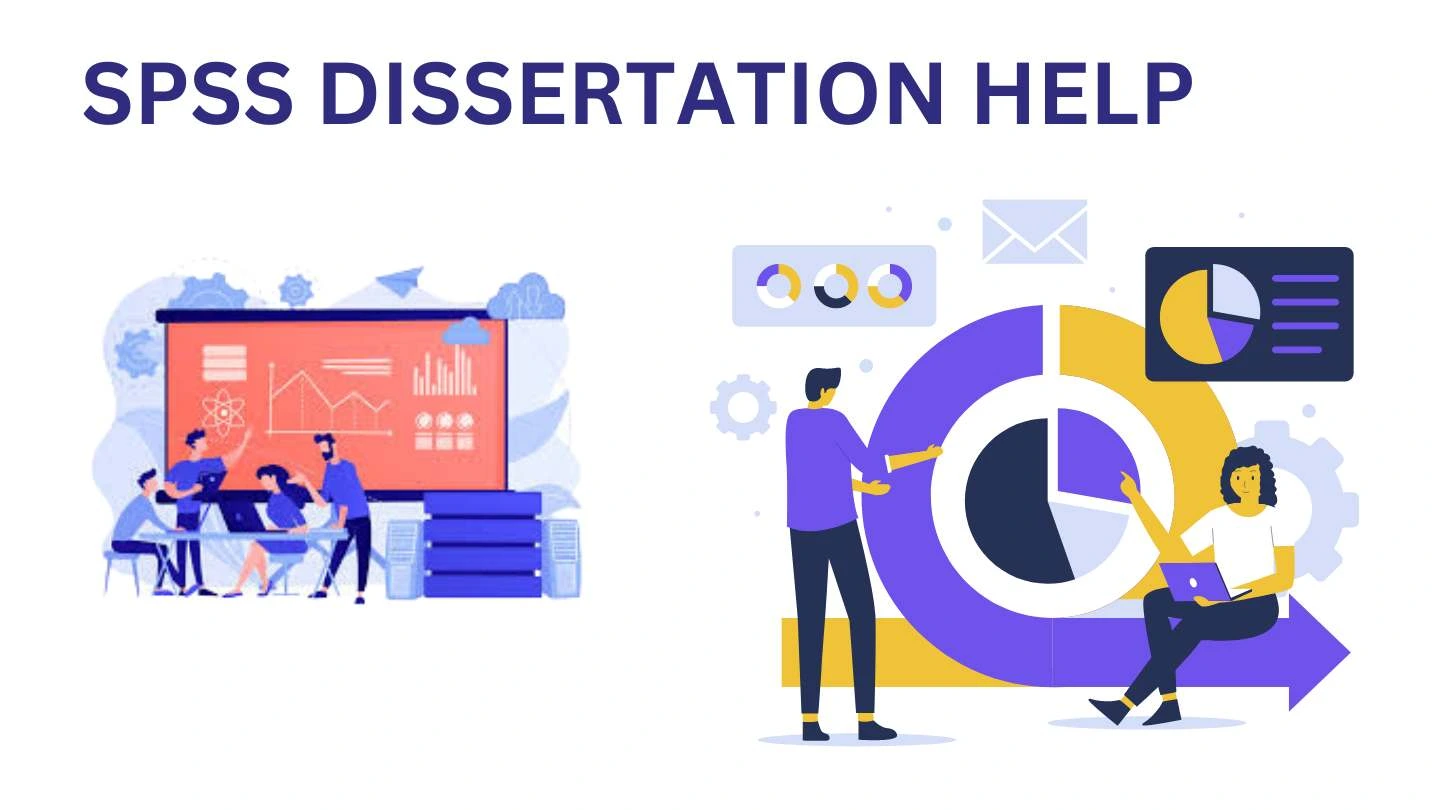What is SPSS and Why is It Important for Your Dissertation?
SPSS stands for Statistical Package for the Social Sciences. It is one of the most widely used software tools for quantitative data analysis in academic research. SPSS has gained popularity due to its ability to simplify complex data analysis procedures. In particular, it allow researchers to manipulate, interpret, and present findings effectively. This has made it especially valuable for students working on dissertations theses, and research projects.
Notably, some of the key features that make SPSS a go-to choice for both beginners and advanced users include:
- Data Management – SPSS allows you to manage large datasets efficiently. You can clean your data, merge multiple datasets, and recode variables, without the need to learn coding.
- Statistical Tests – Whether you need to run t-tests, ANOVA, regression analysis, or factor analysis, SPSS make it easy to run any statistical test you may think of.
- Graphs and Charts – SPSS helps you visualize your data through various graphs and charts, hence, making your findings easier to interpret and present.
- User-Friendly Output: One of the best features of SPSS is its user-friendly output. It provides easy-to-read tables and graphs that simplify the process of interpreting statistical results.
Why Do You Need SPSS Analysis Help For Your Dissertation?

Many students struggle with data analysis using SPSS, especially when working on their dissertations, theses and research projects. While the software is easier to learn, it has a wide range of statistical tests, which can be overwhelming for beginners. Even those with some experience often find it challenging to choose the right tests, clean and manage data, or interpret results correctly.
Researchers and scholars also face challenges with time constraints and complex data sets. This mainly occurs because conducting proper statistical analysis requires not only technical skills but also a deep understanding of research methods. Additionally, balancing coursework, research, and writing can make it difficult to focus on SPSS analysis. Thus, without proper data analysis support, students risk spending hours trying to figure out the software instead of making progress on their dissertation.
However, with professional SPSS data analysis services, students can get accurate and well-presented results section of these important papers. Hiring statisticians for your dissertation can also help you through every data analysis step, from selecting the right tests to creating clear tables and charts. Getting SPSS dissertation help online also saves time, reduces errors, and increases confidence in your research.
Why Do Students Seek Help SPSS Statistics Help For Their Dissertations?
Many students hesitate to admit they need help with SPSS analysis. But let’s be honest—SPSS can be overwhelming, and not everyone has the time or expertise to master it. So, if you’re struggling with your dissertation’s results section, you’re not alone! Most students either find statistical analysis too complex or are too busy juggling other academic and personal responsibilities.
Here are the main reasons students turn to SPSS experts for dissertation data analysis help:
- SPSS is Complicated – Not everyone is a statistician, and SPSS can feel like an overwhelming maze of statistical tests, formulas, and procedures.
- Lack of Time – Balancing coursework, research, and personal life makes it hard to dedicate enough time to learning SPSS and conducting a proper analysis.
- Fear of Errors – Even small mistakes in statistical tests or data interpretation can lead to incorrect conclusions. This can adversely affect the overall quality of your dissertation.
- Need for Accurate Results – Universities expect well-structured, logical, and accurate findings in the results section. Thus, seeking professional SPSS analysis help ensures your data is analyzed correctly.
- Non-Statistics Majors Struggle More – If your field is psychology, business, or healthcare, statistics may not be your strength. Thus, seeking help with SPSS analysis from experts ensure you get accurate and reliable results.
- Confidence in Defending Your Work – Getting expert SPSS help not only gives you accurate results but also helps you understand the analysis. This means that you can confidently explain every aspect of your analysis during your dissertation defense.
Therefore, if you’re feeling stuck, don’t worry—you’re not alone! Seeking SPSS help for your dissertation is a smart decision, not a weakness. Just let the SPSS experts handle the complex statistical work so you can focus on other dissertation chapters.
How We Help with SPSS for Dissertation, Thesis, and Research Projects
Working with SPSS for your dissertation can be confusing, especially if you’re unsure where to start. That’s where we come in. Our expert team guides you through every step of the data analysis process, ensuring accuracy, clarity, and well-structured results. Whether you need help with data preparation, assumption testing, descriptive statistics, or complex inferential analysis, we’ve got you covered.
1. Data Preparation and Assumption Testing
Before running any analysis, your data must be clean and ready for statistical testing. We help you:
- Check for missing values and decide whether to replace or remove them.
- Identify and correct errors in data entry or coding.
- Transform variables where necessary to meet analysis requirements.
- Conduct assumption tests to ensure your data meets the conditions for valid statistical analysis. We check for normality, linearity, multicollinearity, homoscedasticity, and other key assumptions based on the statistical tests you need.
2. Descriptive Statistics: Summarizing Your Data
Before diving into complex analysis, it’s important to understand the basic patterns in your data. We provide:
- Frequency tables to show how often certain values appear.
- Measures of central tendency (mean, median, and mode) to summarize your data.
- Measures of dispersion (range, variance, and standard deviation) to show data variability.
- Graphs and visualizations (histograms, bar charts, and boxplots) for clear data presentation.
These summaries help set the stage for deeper statistical testing and provide an overview of trends in your research data.
3. Inferential Statistics: Testing Your Hypotheses
Once your data is ready, we move to the core of your analysis—testing your hypotheses. Depending on your research questions, we help you select and conduct the right tests, such as:
- T-tests (independent and paired) to compare group means.
- ANOVA to test differences among multiple groups.
- Regression analysis to examine relationships between variables.
- Chi-square tests for categorical data comparisons.
- Factor analysis to identify patterns in large datasets.
Note: Each of the above statistical tests is carefully chosen to match your research objectives.
Final Output: Clear and Well-Presented Results
Once the analysis is complete, we don’t just give you numbers—we provide well-organized output with easy-to-understand explanations. Thus, when you seek help with SPSS analysis from us, you’ll receive:
- Formatted SPSS output files with all results.
- Clear interpretation of findings in simple language.
- Well-structured tables and charts ready for your dissertation.
- Help with APA, Harvard, or any other citation style for reporting statistics.
Therefore, with our SPSS dissertation support, you can confidently complete your dissertation knowing your data analysis is accurate, reliable, and professionally presented. No more second-guessing—just clear, structured results that strengthen your research.
Why Choose Our dissertation SPSS help?
Let’s be honest—SPSS can be frustrating. One minute, you’re confident about your analysis, and the next, you’re drowning in error messages and confusing outputs. That’s why we’re here! We make your SPSS data analysis smooth, accurate, and stress-free. Here’s why students, researchers, and scholars trust us:
Expert Statisticians at Your Service
Your dissertation deserves more than guesswork. Our team consists of experienced statisticians who understand SPSS inside out. Whether it’s simple descriptive stats or complex multivariate analysis, we ensure your data is analyzed correctly.
Step-by-Step Explanations
We don’t just give you results—we help you understand them. Our experts break down every analysis into simple terms, so you can confidently interpret and discuss your findings in your dissertation defense.
Custom SPSS Analysis Help
Every dissertation is unique, and so is our approach. We tailor our SPSS support to match your specific research questions, hypotheses, and academic level. This ensures your results section is relevant and meaningful.

Accurate & Reliable Results
Statistical errors can ruin your research credibility. We perform all necessary assumption tests—normality, multicollinearity, homoscedasticity, and more—to ensure your results are valid and reliable.
Clear Interpretation & Presentation of Results
SPSS outputs can be overwhelming. We organize your results into easy-to-read tables and graphs, provide proper formatting (APA, Harvard, etc.), and offer well-structured interpretations to make your dissertation writing easier.
Fast Turnaround Without Compromising Quality
Tight deadlines? No problem. We work efficiently to deliver accurate analysis on time, so you can focus on writing your dissertation without last-minute panic.
How Our SPSS Dissertation Help Works
Getting expert SPSS thesis help online has never been easier! However, our simple and straightforward process ensures you receive accurate and high-quality analysis without stress. Here’s how it works:

1. Submit Your Project
Click the Order Now button and fill out a short form. Provide key details like your academic level, research topic, type of analysis needed, and deadline. The system will instantly calculate the cost of your order.

2. Make Payment
Once you review the price, proceed with a secure payment. Need a discount or have any questions? Our friendly Support Team is always available to assist you.

3. Download Your Results
We assign your dissertation to an experienced SPSS analyst who ensures accurate statistical tests and proper interpretations. You can track progress through your personal dashboard. Once completed, we’ll notify you via email, and you can download your final results/findings chapter—ready for your discussion chapter!
What Our Customers Say
At DissertationDataAnalysisHelp, we take pride in helping students, researchers, and scholars successfully complete their dissertations by providing accurate SPSS Analysis Help services. But don’t just take our word for it—see what our satisfied clients have to say!
Dr. Rachel Thompson
PhD Candidate, USA
⭐⭐⭐⭐⭐
“I was overwhelmed by my statistical analysis, but their SPSS data analysis experts made everything so much easier. They cleaned my dataset, run assumption tests, and explained my regression results in a way I could understand. My defense went smoothly, and I couldn’t be happier!”
Mark Edwards
Master’s Student, Canada
⭐⭐⭐⭐⭐
“I had no idea how to run an ANOVA test or interpret the results. Their team not only completed the analysis for me but also provided a clear breakdown of the findings. My professor was impressed with my dissertation results section!”
Jessica Williams
Undergraduate Student, Australia
⭐⭐⭐⭐⭐
“SPSS was my biggest challenge in writing my dissertation. The team guided me through descriptive statistics and hypothesis testing, making the process stress-free. I finally understood my data, and I got an A!”
Dr. Daniel Carter
Doctoral Student, UK
⭐⭐⭐⭐⭐
“My research involved complex multivariate analysis, and I needed expert help. They handled everything professionally, ensuring my results were accurate and well-presented. Their support was invaluable in completing my PhD!”
Frequently Asked Questions
We assist with all aspects of SPSS data analysis, including data cleaning, assumption testing, descriptive statistics, inferential analysis (t-tests, ANOVA, regression, factor analysis, etc.), and result interpretation.
We do more than just provide output! Our experts will also write your dissertation results section for you. This ensures you understand the findings and can confidently discuss them in your dissertation.
Absolutely! We’ll not only run the tests but also provide detailed interpretations to help you understand your results.
The turnaround time depends on the complexity of your project. However, we offer different urgency levels, from standard delivery to expedited services for tight deadlines.
Yes! While SPSS is primarily used for quantitative analysis, we can also assist in integrating SPSS results with qualitative findings to strengthen your research.
Get Expert SPSS Help for Your Dissertation Today!
Struggling with data analysis using SPSS? Don’t let complex statistics slow you down! Our expert statisticians are ready to handle your data, run the right tests, and provide clear, easy-to-understand results.
Let our SPSS experts take the stress out of your dissertation analysis. No more guesswork, errors, or wasted hours—just accurate results and a clear path to success!

